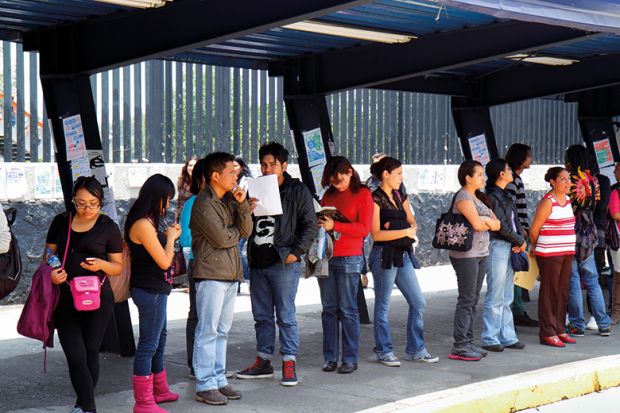A bold promise from Mexico’s newly elected president to create 100 new public universities within his first term has been met with frustration from the academic community, who say the pledge is impractical.
Left-winger Andrés Manuel López Obrador won the presidential election in July with more than 53 per cent of the vote – more than double that of his closest challenger.
In the wake of his victory, the incoming president – known as “Amlo” – said he wanted to see all school-leavers enter higher education, helped by the creation of 100 new institutions to host them all.
His pledges go against the education reforms implemented by outgoing president Enrique Pena Nieto – still in office until December – who has been criticised for encouraging the privatisation of higher education, allowing corporations to award degrees of questionable quality and underfunding public institutions.
Less than a third of high school-leavers currently go on to university in Mexico – one of the lowest enrolment rates across Latin America. Mr López Obrador has said he hopes to offer full scholarships to all middle-income students to help improve this figure.
But academics argue that Mexico’s primary problem is its lack of qualified teachers and lecturers, and that efforts and funding would be best concentrated in the training and retention of skilled educators.
Philip Altbach, founding director of the Center for International Higher Education at Boston College, said opening new universities in the country was “among other things totally impractical”.
“There would not be enough people qualified to teach at such institutions in the short term,” he explained. “The amount of money needed to develop 100 universities would be immense. It would be more practical to expand some of the existing universities and provide them with more funds.
“The money, or at least some of it, could better be spent on improving schools and teachers.”
Alma Maldonado, a higher education researcher at Mexico City’s Centre for Research and Advanced Studies of the National Polytechnic Institute, agreed that making higher education mandatory would fail to solve pre-existing barriers to access and equality facing underprivileged students in the country.
Of the students who entered the country’s largest public university, the National Autonomous University of Mexico, in 2016, for example, only 2 per cent came from the lowest socioeconomic background; many failed the entry examinations.
“This point is not being discussed and [yet] it is an essential point [for] a left government,” she said.
In his previous role as mayor of Mexico City, Mr López Obrador created the Autonomous University of Mexico City, a publicly funded university that, unlike most other institutions in the country, had no admission exam and instead awarded places in a lottery.
This legacy offered cause for concern for Beatriz Rumbos, dean of the department of science, mathematics and statistics at Mexico City’s Mexico Autonomous Institute of Technology, however, who noted that graduation rates for such a system are “very, very low”.
“Amlo is promising a lot of things that are clearly not feasible,” she said. “It would certainly be better to promise, as a first step, to overhaul existing public universities, especially in the provinces. He has also not suggested the creation of quality technical colleges, which are [also] desperately needed.”
A spokesperson for the National Association of Universities and Higher Education Institutions in Mexico said that the practicalities of Mr López Obrador’s higher education overhaul were still being worked out, but that another option would be to build upon the capacity of pre-existing public universities.
Register to continue
Why register?
- Registration is free and only takes a moment
- Once registered, you can read 3 articles a month
- Sign up for our newsletter
Subscribe
Or subscribe for unlimited access to:
- Unlimited access to news, views, insights & reviews
- Digital editions
- Digital access to THE’s university and college rankings analysis
Already registered or a current subscriber?








